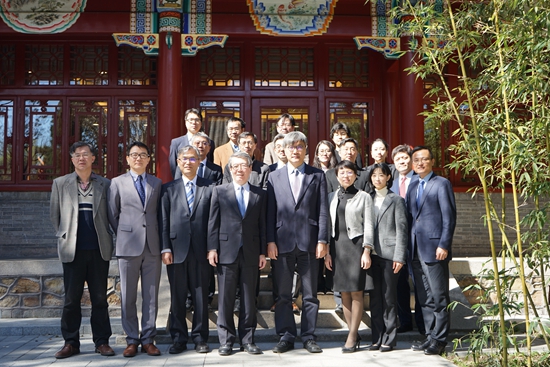Executive Vice President of University of Tokyo visits Peking University
Apr 01, 2019
Peking University, April 1, 2019: On the morning of March 21, Professor Masashi Haneda, executive vice president of the University of Tokyo, visited Peking University, accompanied by Professor Takeo Nakashima, Professor Yasuhiro Matsuda, both from Institute for Advanced Studies on Asia and Professor Takeo Ishii from School of Arts and Sciences at the University of Tokyo. Vice President of Peking University Wang Bo welcomed the guests at Linhuxuan. A signing ceremony of “Joint Program of East Asian Studies" was held at the same time. The ceremony was presided over by Zhang Xudong, professor of the Department of Chinese Language and Literature and director of the Center of International Critical Theory at PKU.
 Group photo
Group photo
Vice President Wang Bo stated that Peking University and the University of Tokyo are of strategic importance for boosting higher education and academic insights in China and Japan respectively. He also mentioned that both universities have irreplaceable influence and prestige among the two countries, and therefore are responsible for exploring the theory and practice on developing East Asian research. In order to promote this international program, deeper cooperation between the two universities is necessary, which needs strategic consensus reached by leadership from the two universities, as well as long-term communication and cooperation between scholars from the two universities. Wang expressed his gratitude to all the departments that participated actively in the preparation of the program and put forward expectations for the future implementation of the project.
Professor Masashi Haneda said that the rapid progress of the program is benefitted from the mutual trust and long-term cooperation between University of Tokyo and Peking University. The launch of the "Art and Literature Academy" of the University of Tokyo (the PKU-UTokyo “Joint Program of East Asian Studies") is of great academic and educational significance. Academically, the program is expected to integrate knowledge of East Asian with that of the west, and put forward thought-provoking insights on contemporary society based on the East Asian civilization. In terms of education, the program, as a pioneering model of liberal education, requires students to master Japanese, Chinese and English in order to build a knowledge system adaptive to the contemporary world. Haneda hoped the joint program, though started small, would grow big and make more contributions to international education and academic studies in the future.
Written by: Qiu Kanghua
Edited by: Fu Wenyun
Source: PKU News (Chinese)
